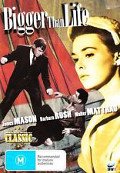
Directed by
Nicholas Ray
95 minutes
Rated PG
Reviewed by
Bernard Hemingway

Bigger Than Life
Nicholas Ray’s nuclear (yes, that's a pun)-family-in-crisis suburban melodrama, a return to the terrain of his iconic Rebel Without A Cause of the previous year, isn’t very good as a film but it offers a good deal of fun largely thanks to James Mason’s performance as a loving husband and father who becomes psychotic as a result of self-medication.
Derived from an article by Berton Roueché that had appeared in The New Yorker magazine Bigger Than Life is the fact-based story of how Ed Avery (Mason) is prescribed cortisone in order to offset a rare life-threatening heart condition. The drug is successful in treating the physical symptoms but results in a raft of psychological side-effects – paranoia, delusions and aggressive behaviour that threaten his home, marriage and even his life.
Mason was the film’s producer and presumably saw an opportunity to impress with his portrayal of the unfortunate Ed but in Ray's hands the film never rises above the programmatic, climaxing in a scene in which the psychotic Ed plans to sacrifice his son (Christopher Olsen) just as Abraham did Isaac. When his wife Lou (Barbara Rush) points out that God stopped Abraham, Ed, inflamed with moral rectitude yells out ‘God was wrong”. It’s an unintentionally funny moment that is well-matched by the gushing closing scene of the loving family reunited. In between Ray indulges his B-movie proclivities with a scene in which Mason brawls with Walter Matthau as his solicitous gym-teacher buddy. .Whatever one-time pin-up boy Mason might have intended with his permanent five o’clock shadow and oily skin (presumably the consequence of his pomade oozing onto it) he looks terrible (Matthau doesn't look much better, so perhaps it was intended to add to the realism).
If failing to be effective dramatically the film serves as a critical portrait of 1950s suburban America, the mundanity of the Avery’s prosaic lives emphasized by the tourist posters of iconic European cities hanging on their walls whilst Ed's delusions represent patriarchal values gone very wrong. It was for these qualities (and their unvarnished B-grade realization) that the Nouvelle Vague critics championed the film although, as with Rebel, the film ultimately opts to reinstate the happy family ideal.
FYI: If you want to see the same terrain explored but with considerably more finesse the contemporaneous films of Douglas Sirk will be more rewarding.
Olsen who plays the son, Richie. was an enormously popular child star during the 1950s on both the big and small screens appearing in Hitchcock'sThe Man Who Knew Too Much.(1956) and Douglas Sirk's The Tarnished Angels (1958) but his career did not extend beyond the decade.
Want something different?





